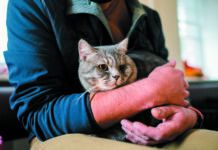At the College of Veterinary Medicine at Kansas State University, a new research project has proven to be promising in treating feline infectious peritonitis (FIP), a lethal feline disease that has been almost 100 percent fatal. Because of the deadliness of FIP, there have been many efforts to develop effective treatments — but none have been at all successful up until now.
Along with various collaborators, Yunjeong Kim, DVM, PhD, DACVM, has developed an antiviral compound for feline coronavirus associated with FIP. Her study has recently been published in the journal, PLOS Pathogens.
“FIP is caused by coronavirus infection,” explains Dr. Kim, an associate professor in the Kansas State University’s diagnostic medicine and pathobiology department. “Coronavirus infections are very common among cats. However, in most cases, these viral infections cause mild and self-limited enteritis or no symptoms. But some cats will develop a fatal disease which is FIP.”
According to Dr. Kim: “FIP arises from certain viral mutation that occur in the infected cats and failure of host immune system to contain such mutated viruses.” The development of FIP in cats is primarily immune-mediated, and it is the host immune response to virus infection that causes disease in the affected cats. FIP is generally found in young cats less than two to three years old.
FIP occurs in two forms: effusive (wet form), or non-effusive (dry form). The wet form is more common, and is characterized by fluid accumulation in the abdominal area or chest cavity. Symptoms may include fever, jaundice, bodily effusions and weight loss. Once the clinical symptoms develop, they tend to progress rapidly and result in death or euthanasia within weeks to months.
Because FIP disease progression is so rapid — and the development is primarily immune-mediated — it has been unknown whether antiviral treatment on its own can be effective at reversing disease progression in an infected cat. The results of this study demonstrate that the key to the treatment of FIP is inhibiting viral replication.
“This is the first time we showed experimental evidence of successful treatment of laboratory cats at an advanced clinical stage of FIP,” said Dr. Kim. “The knowledge gained from this study is a step forward to understanding the pathogenesis of FIP and other coronavirus infections important in both humans and animals.
“Also, since it is the first report on the effective antiviral drug for coronavirus infection in a natural host, it has implications for developing effective treatment measures for other coronavirus infections, including human coronaviruses.”— Catnip staff



